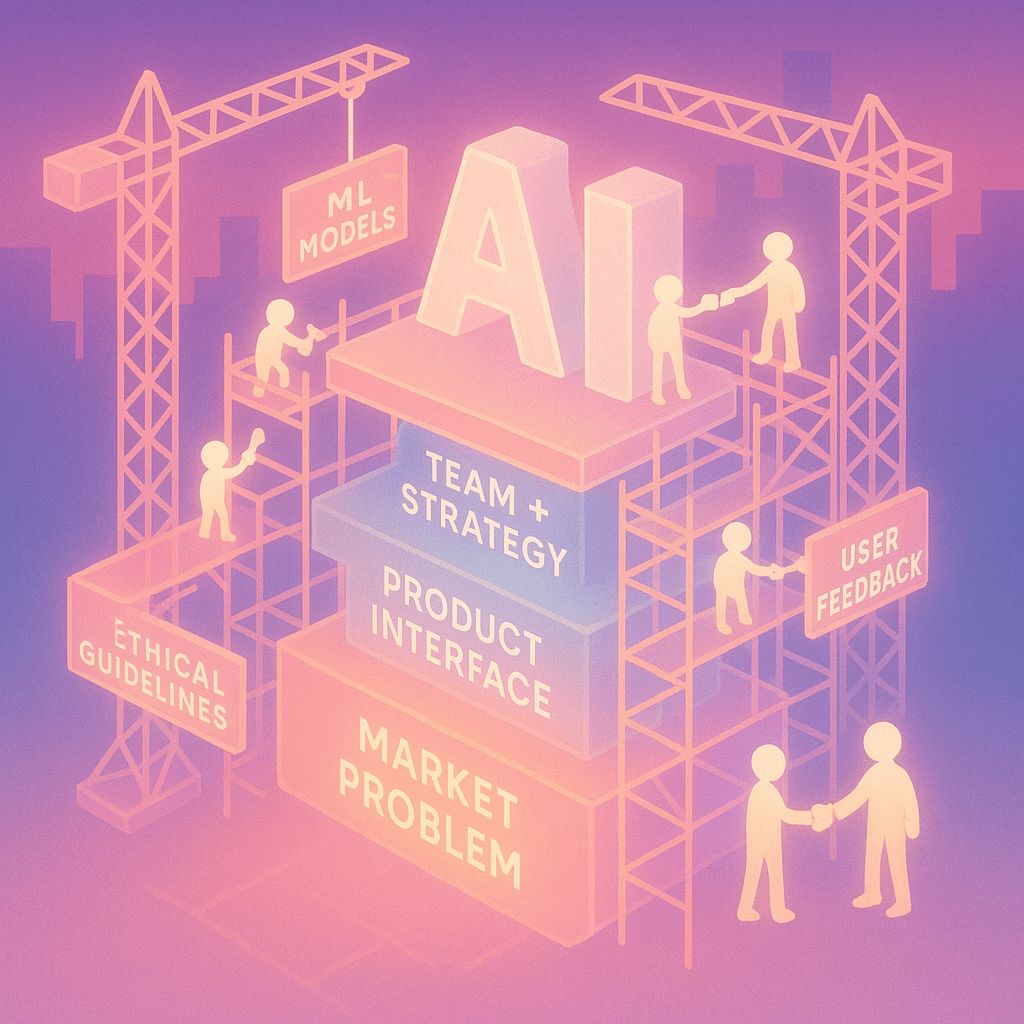
Solving a real market problem, not just showcasing technical talent, is the foundation of every great AI startup. If your product doesn’t address a clear, painful need, it won’t matter how smart your models are.
Here’s a practical roadmap for building an AI company that actually delivers value.
1. Start with a Market Fit, Not Just an LLM
Before writing code, make sure your AI is solving something real:
Audit your internal resources, data quality, and team expertise
Identify any infrastructure or talent gaps early
Make sure you have access to clean, relevant data, no good model survives bad training inputs
Validate that the problem is big enough to be worth solving
Don’t build a solution looking for a problem
2. Develop a Unique and Scalable AI Solution
To stand out in a crowded AI space:
Create a clear, unique value proposition
Focus on a specific use case or vertical that AI can uniquely solve
Don’t just wrap existing LLMs in a UI, deliver measurable outcomes like speed, savings, or insight
Show value fast and iterate based on real usage
3. Assemble a High-Leverage Team
Your product is only as strong as your team:
Hire a mix of AI/ML engineers, data scientists, product leads, and domain experts
Tap into university networks, communities, and outstaffing to scale
Prioritize curiosity, flexibility, and a bias for execution
Build a culture of experimentation and fast learning

4. Raise Smart Capital
Capital fuels growth:
Explore bootstrapping, grants, research funds, AI competitions, angel investors, venture capital, and crowdfunding
Prepare a compelling pitch deck that clearly demonstrates your problem, solution, market potential, team strengths, and projected ROI
Build a prototype or MVP to showcase your AI's capabilities (critical for attracting investors)
Seek investors who understand AI and your industry; "smart money" provides valuable guidance beyond capital
5. Build Robust, Scalable Infrastructure
Technical foundation matters:
Leverage cloud platforms (AWS, Google Cloud, Azure) for flexible, scalable compute and storage
Integrate data management and model tracking tools for efficient development
Prioritize cybersecurity and data privacy from day one, especially when handling sensitive data
Develop frameworks for ethical AI, bias mitigation, and algorithmic transparency
6. Develop and Iterate Your AI Product
Product development requires discipline:
Launch with a minimum viable product to validate your concept and gather user feedback quickly
Use agile methodologies to iterate rapidly based on market needs
Invest heavily in data cleaning and real-world scenario validation. "Garbage in, garbage out" is especially true for AI startups
Consider synthetic data or transfer learning to overcome data scarcity challenges

7. Go-to-Market and Monetization
Revenue generation requires strategy:
Focus on a narrow, high-impact use case to gain traction before expanding
Leverage partnerships, early adopter programs, and community engagement for feedback and organic growth
Consider subscription-based SaaS, licensing, consulting, or AI-as-a-Service (APIs) models
Ensure your pricing aligns with the value delivered and remains sustainable as you scale
8. Address Common AI Startup Challenges
Anticipate and plan for:
Security and privacy concerns, with comprehensive compliance measures
High computing costs, especially for model training
Talent shortages, which require competitive compensation and flexible work policies
Ethical considerations and bias mitigation to build trust
Resource planning that accounts for the significant time, talent, and capital needed to build AI products
Conclusion
Building an AI startup isn’t just about models, it’s about solving real problems, fast.
Get the problem right, stay focused, move fast, and iterate ruthlessly. Pair AI with insight and execution, and you'll build something that matters.
Want to automate repetitive tasks in your AI startup journey? Try Wordware AI for free.
It's like having a dedicated assistant who handles time-consuming documentation, market research compilation, and communication tasks while you focus on building your AI product and growing your business. Just tell Wordware what you need automated, and spend more time on innovation rather than repetitive work.